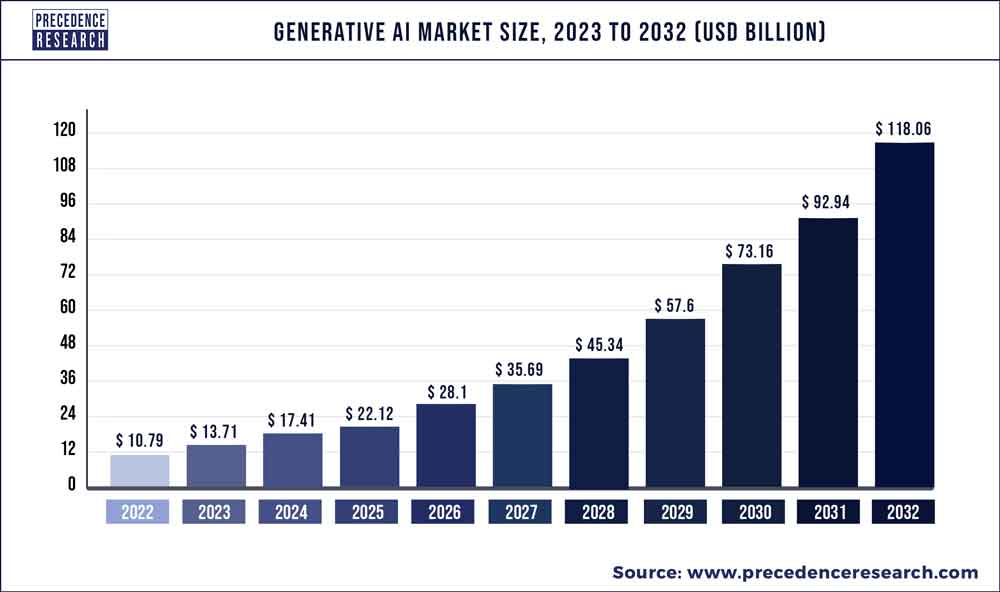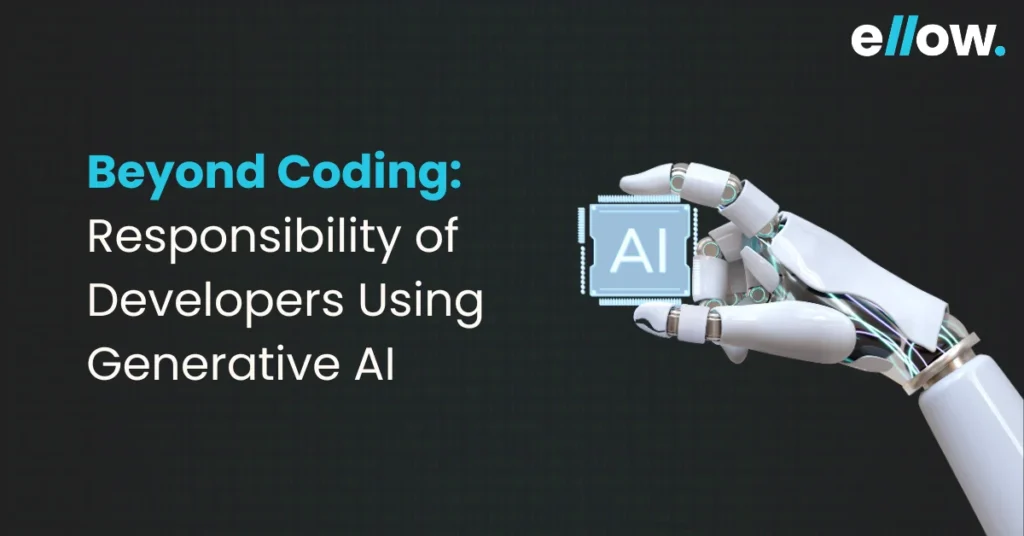The rise of generative artificial intelligence (AI) brings to the forefront critical inquiries about the ethical obligations of its creators.
Such questions delve into the very essence of the developers’ roles: Is their duty confined solely to innovation and the expansion of machine capabilities?
With Forbes projecting the global AI market to soar to $1,811.8 billion by 2030, this explosive growth highlights not only the vast potential of AI across numerous industries but also accentuates the increasing importance of addressing these ethical considerations.
As we navigate the complexities of technological advancements, we must have a moral compass. Generative AI holds immense potential to address global crises while enhancing existing innovations for the benefit of humanity worldwide.
This opportunity highlights the critical need for responsible development practices that prioritize fairness, privacy, and safety.
Ensuring that advancements in AI are grounded in ethical principles and contribute positively to the greater good necessitates collaborative efforts across the AI ecosystem.
In this blog, we will delve into the responsibilities that come with developing AI technologies, highlighting best practices for creating transparent, fair, and secure AI systems.
What is Generative AI and why is everyone talking about it?

Generative AI refers to a subset of artificial intelligence technologies that can generate new content, ideas, or data that mimic human-like creativity. This includes everything from writing text, composing music, and creating realistic images and videos, to developing new designs or patterns.
It leverages complex machine learning models, particularly neural networks, to analyze vast amounts of data, learn patterns, styles, or structures, and then produce new creations that are original yet reminiscent of the data it was trained on.

The global generative AI market size was estimated at USD 10.79 billion in 2022 and is projected to hit around USD 118.06 billion by 2032.
The buzz around Generative AI is due to its revolutionary potential across various sectors. It’s not just about automating tasks or analyzing data anymore; it’s about machines being able to create, innovate, and perhaps even inspire.
In industries like entertainment, where it can generate music or scriptwriting, in design, where it can produce unique concepts, or in technology, where it can develop software code, the implications are vast.
The best practices recommend for developers
Here are the best practices recommended for developers:
1. Be transparent about data collection
Being transparent about data collection means being open about what information from users is being gathered, how it’s being used, and who it’s shared with.
This is crucial for establishing trust with users. By following data privacy laws and regulations, developers show respect for users’ privacy rights. It’s like being honest about what personal details you’re collecting from someone before using it. This helps users feel more comfortable and confident in sharing their information.
2. Control access to the API
Controlling access to the API means limiting who can use it to approved individuals or organizations. This helps prevent misuse or unauthorized access, maintaining the integrity and security of the technology.
Developers should take steps to safeguard their API keys, which act as digital access passes. By controlling access in this way, developers can ensure that only those who are supposed to use the API can do so, reducing the risk of abuse or exploitation.
3. Filter and moderate content
Filtering and moderating content involves using tools to ensure that any information generated or shared through the API is appropriate and aligns with community standards. This process helps prevent the dissemination of offensive or harmful content.
Developers can utilize built-in filters provided by the API, as well as implement additional moderation tools available in the market. By doing so, developers can maintain a safe and positive environment for users while using the API for various purposes.
4. Use the API for socially beneficial purposes
Using the API for socially beneficial purposes means employing it in ways that positively impact society. For instance, it could involve using the API to provide educational resources, support mental health initiatives, or enhance accessibility to information for people.
By focusing on socially beneficial applications, developers contribute to making the technology a force for good, benefiting users and society as a whole. It’s about leveraging the capabilities of AI in ways that improve people’s lives and address societal needs.
5. Respect for user privacy
Respecting user privacy means obtaining permission before collecting their data and safeguarding it from unauthorized access. Developers must prioritize protecting sensitive information, like personal details or browsing history, from misuse or breaches.
This involves implementing security measures such as encryption and secure storage. By being transparent about data handling practices and respecting user preferences, developers can build trust with their audience and ensure a safe and responsible use of technology.
6. Consider harm and risk to users
Before deploying AI outputs that could affect user well-being, thorough evaluations should be conducted. If there’s a possibility of harm, caution should be exercised.
However, if the AI-generated content poses no significant risk and is comparable to human-generated content, it may be acceptable under proper guidance. This ensures that user safety and well-being are prioritized in AI development and deployment.
7. Avoid creating offensive or improper information
Developers must avoid creating material that could be offensive or inappropriate to users. This involves adhering to guidelines and considering cultural sensitivities to maintain a positive experience for all. By prioritizing ethical content creation, developers can build trust with their audience and avoid potential backlash or harm caused by offensive or improper information.
8. Offer value to consumers
Offering value to consumers means prioritizing their needs and providing them with useful, relevant, and meaningful content or services. This involves avoiding overly aggressive or deceptive advertising tactics that could annoy or mislead users.
Instead, developers should focus on creating positive experiences that genuinely benefit users, such as offering helpful information, solving their problems, or enhancing their lives in some way. Ultimately, the goal is to build trust and foster long-term relationships with consumers by delivering value and respecting their interests and preferences.
Potential dangers and precautions to take
When using AI in advertising, there are potential dangers to be aware of. It is important to take precautions to avoid these risks. One danger is the misuse of data by advertisers.
To prevent this, developers should be transparent about how AI is being used in advertising and inform users about their data usage. Another concern is the ethical use of AI in advertising. Developers should ensure that AI technologies are applied responsibly and ethically. This includes being transparent about the use of chatbots and other AI tools in advertising campaigns.
To address these concerns, it is important to follow best practices and guidelines for AI governance. Regulations such as the proposed Artificial Intelligence Act by the European Union aim to create a legal framework for the responsible use of AI in advertising.
Developers should openly disclose the use of AI in advertising, provide clear information to users about data usage, and ensure that AI technologies are used responsibly and ethically. By taking these precautions, the potential dangers associated with AI in advertising can be minimized.
Room to innovate responsibly
Developers have ample opportunity to innovate and create exciting applications using AI technology, like the ChatGPT API. Developers must prioritize responsible and ethical usage of AI to safeguard user privacy and data. This involves following best practices and ethical principles such as transparency, fairness, and maintaining human control over AI systems.
When incorporating AI into advertising, developers must be cautious of potential ethical issues and take necessary precautions to prevent misuse. Despite busy schedules, developers must ensure their AI usage remains responsible and ethical. This includes being transparent, thoroughly understanding privacy policies, and adhering to data protection and security best practices.
For data privacy or governance teams, it is important to be informed about AI usage and have operational frameworks in place to govern its application. These efforts contribute to building a more responsible and ethical AI ecosystem, fostering continued innovation and benefiting society as a whole.
Conclusion
Generative AI holds great promise, yet it requires careful handling to ensure ethical and responsible deployment. By recognizing its limitations, correcting biases, being transparent, safeguarding sensitive data, ensuring accountability, monitoring usage continuously, educating users, addressing legal and ethical issues, seeking expert guidance, setting content standards, and updating practices regularly, organizations can responsibly utilize generative AI. This approach helps mitigate unintended consequences and fosters the ethical use of AI technology.
Recommended Reads
Ethics in Generative AI: Concerns, Examples, and Best Practices
Generative AI vs. Predictive AI: What is the difference?









